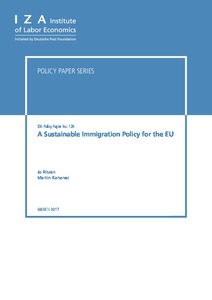A sustainable immigration policy for the EU
"A sustainable EU Immigration Policy aims to contribute to a vibrant European society through more effectively and selectively managed immigration from outside the EU, more attention to integration of immigrants, more rooting out of discrimination, more asylum centres close to areas of conflict...
| Main Authors: | , |
|---|---|
| Institution: | ETUI-European Trade Union Institute |
| Format: | TEXT |
| Language: | English |
| Published: |
Bonn
2017
IZA |
| Subjects: | |
| Online Access: | https://www.labourline.org/KENTIKA-618212443649-a-sustainable-immigration-poli.htm |
| Summary: | "A sustainable EU Immigration Policy aims to contribute to a vibrant European society through more effectively and selectively managed immigration from outside the EU, more attention to integration of immigrants, more rooting out of discrimination, more asylum centres close to areas of conflict, and more attention to education and training in areas where refugees have settled. Immigration from outside the EU is often opposed, mainly because of sluggish integration combined with tensions in actual and perceived values between immigrants and native populations. These divisions affect not only the first generation of immigrants, but also those that follow. We propose a sustainable, win-win policy fostering the benefits of immigration and in line with the preferences of EU citizens holding not only positive but also more sceptical views on immigration while relying on adherence to human rights. The proposed policy is directed towards more effectively and selectively managed immigration based on the employability potential of the immigrant, combined with more attention to integration and stricter measures to fight discrimination. We also acknowledge the need for a robust policy framework to cope with asylum and abrupt large-scale waves of refugees wanting to enter the EU, resulting from conflicts, natural catastrophes, and other sudden or violent events. We propose screening schemes for refugee camps surrounding countries they have fled to determine migrants’ refugee status, channelling them either as economic migrants, selected on their employability, or through a humanitarian scheme that respects the EU’s multilateral and bilateral commitments. Such a humanitarian scheme would be embedded into education-cooperation policies, to provide better opportunities to qualify for admission and substantially greater support for refugees." |
|---|---|
| Physical Description: | 29 p. Digital |

